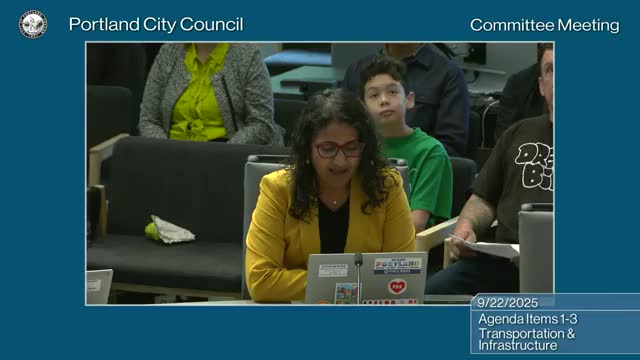Portland Council Approves Permanent Plaza Program Enhancing Community Spaces and Local Business
September 22, 2025 | Portland, Multnomah County, Oregon
This article was created by AI summarizing key points discussed. AI makes mistakes, so for full details and context, please refer to the video of the full meeting. Please report any errors so we can fix them. Report an error »

The Portland City Council's Transportation & Infrastructure Committee met on September 22, 2025, to discuss the future of the city's Street Plaza Program, which has become a vital part of community life. The program, which began as temporary initiatives during the pandemic, has evolved into a proposal for permanent public spaces that foster connection, support local businesses, and enhance neighborhood pride.
The committee highlighted the success of existing plazas, such as Ankeny Alley and Pride Plaza, which have proven to be lasting assets for the community. These spaces not only provide car-free areas but also serve as venues for cultural expression and community gatherings. The Portland Bureau of Transportation (PBOT) presented a comprehensive package of resolutions and ordinances aimed at formalizing the plaza program, establishing clear guidelines for their creation, management, and maintenance.
Art Pierce, PBOT's deputy director, emphasized the importance of investing in public spaces, particularly in light of the ongoing challenges posed by COVID-19 and the rise of remote work. He noted that about 30-40% of the city's land is dedicated to streets and public spaces, making it crucial to curate these areas to enhance community engagement and economic recovery.
The proposed framework aims to clarify expectations for plaza stewardship and outlines a collaborative approach involving the city, local businesses, and community members. This partnership model is designed to ensure that plazas remain vibrant and welcoming, with shared responsibilities for maintenance and programming.
Tiffany Swift, a senior planner at PBOT, provided an overview of the program's structure, which includes seasonal, exploratory, and permanent plazas. Currently, there are 20 active plazas in Portland, with plans for further development. The transition from a pilot program to a permanent initiative reflects the city's commitment to creating clean, active, and inviting public spaces.
The committee also discussed proposed changes to permit fees for events held in plazas, aiming to reduce barriers for nonprofits and encourage outdoor dining. The adjustments would simplify the process for businesses looking to utilize plaza spaces, fostering a lively atmosphere that attracts visitors and supports local economies.
In conclusion, the meeting underscored the city's dedication to enhancing public spaces through the Street Plaza Program, which not only addresses immediate community needs but also aligns with broader goals of economic recovery and social connection. As the program moves forward, Portland aims to create a more inclusive and engaging urban environment for all residents.
The committee highlighted the success of existing plazas, such as Ankeny Alley and Pride Plaza, which have proven to be lasting assets for the community. These spaces not only provide car-free areas but also serve as venues for cultural expression and community gatherings. The Portland Bureau of Transportation (PBOT) presented a comprehensive package of resolutions and ordinances aimed at formalizing the plaza program, establishing clear guidelines for their creation, management, and maintenance.
Art Pierce, PBOT's deputy director, emphasized the importance of investing in public spaces, particularly in light of the ongoing challenges posed by COVID-19 and the rise of remote work. He noted that about 30-40% of the city's land is dedicated to streets and public spaces, making it crucial to curate these areas to enhance community engagement and economic recovery.
The proposed framework aims to clarify expectations for plaza stewardship and outlines a collaborative approach involving the city, local businesses, and community members. This partnership model is designed to ensure that plazas remain vibrant and welcoming, with shared responsibilities for maintenance and programming.
Tiffany Swift, a senior planner at PBOT, provided an overview of the program's structure, which includes seasonal, exploratory, and permanent plazas. Currently, there are 20 active plazas in Portland, with plans for further development. The transition from a pilot program to a permanent initiative reflects the city's commitment to creating clean, active, and inviting public spaces.
The committee also discussed proposed changes to permit fees for events held in plazas, aiming to reduce barriers for nonprofits and encourage outdoor dining. The adjustments would simplify the process for businesses looking to utilize plaza spaces, fostering a lively atmosphere that attracts visitors and supports local economies.
In conclusion, the meeting underscored the city's dedication to enhancing public spaces through the Street Plaza Program, which not only addresses immediate community needs but also aligns with broader goals of economic recovery and social connection. As the program moves forward, Portland aims to create a more inclusive and engaging urban environment for all residents.
View full meeting
This article is based on a recent meeting—watch the full video and explore the complete transcript for deeper insights into the discussion.
View full meeting
